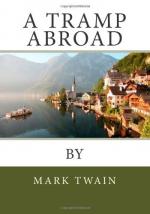I had been well scorched by the young woman, but no matter, I took it out on Harris. One should always “get even” in some way, else the sore place will go on hurting.
CHAPTER XXVI [The Nest of the Cuckoo-clock]
The Hofkirche is celebrated for its organ concerts. All summer long the tourists flock to that church about six o’clock in the evening, and pay their franc, and listen to the noise. They don’t stay to hear all of it, but get up and tramp out over the sounding stone floor, meeting late comers who tramp in in a sounding and vigorous way. This tramping back and forth is kept up nearly all the time, and is accented by the continuous slamming of the door, and the coughing and barking and sneezing of the crowd. Meantime, the big organ is booming and crashing and thundering away, doing its best to prove that it is the biggest and best organ in Europe, and that a tight little box of a church is the most favorable place to average and appreciate its powers in. It is true, there were some soft and merciful passages occasionally, but the tramp-tramp of the tourists only allowed one to get fitful glimpses of them, so to speak. Then right away the organist would let go another avalanche.
The commerce of Lucerne consists mainly in gimcrackery of the souvenir sort; the shops are packed with Alpine crystals, photographs of scenery, and wooden and ivory carvings. I will not conceal the fact that miniature figures of the Lion of Lucerne are to be had in them. Millions of them. But they are libels upon him, every one of them. There is a subtle something about the majestic pathos of the original which the copyist cannot get. Even the sun fails to get it; both the photographer and the carver give you a dying lion, and that is all. The shape is right, the attitude is right, the proportions are right, but that indescribable something which makes the Lion of Lucerne the most mournful and moving piece of stone in the world, is wanting.
The Lion lies in his lair in the perpendicular face of a low cliff—for he is carved from the living rock of the cliff. His size is colossal, his attitude is noble. How head is bowed, the broken spear is sticking in his shoulder, his protecting paw rests upon the lilies of France. Vines hang down the cliff and wave in the wind, and a clear stream trickles from above and empties into a pond at the base, and in the smooth surface of the pond the lion is mirrored, among the water-lilies.
Around about are green trees and grass. The place is a sheltered, reposeful woodland nook, remote from noise and stir and confusion—and all this is fitting, for lions do die in such places, and not on granite pedestals in public squares fenced with fancy iron railings. The Lion of Lucerne would be impressive anywhere, but nowhere so impressive as where he is.




